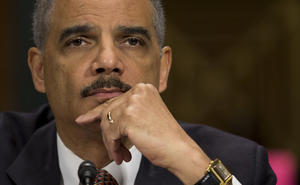SurveillanceU.S. secretly obtains AP phone records to identify source of story
In what the AP calls a “massive and unprecedented intrusion” into the news organization’s news work, the U.S. Justice Department secretly gathered two-months-worth of telephone records of the agency’s reporters and editors. The AP says the records listed incoming and outgoing calls to the offices and homes of reporters and editors. The Justice Department began collecting the phone records in order to identify the source or sources of a 7 May 2012 AP story which detailed a secret CIA operation in Yemen to intercept an al Qaeda-sponsored attempt to load an IED onto a U.S.-bound airplane.

U.S.Attorney General Eric Holder // Source: kakoluri.com
In what the AP calls a “massive and unprecedented intrusion” into the news organization’s news work, the U.S. Justice Department secretly gathered two-months-worth of telephone records of the agency’s reporters and editors.
The AP says the records listed incoming and outgoing calls to the offices and homes of reporters and editors.
The government collected that information for twenty phone lines in April and May 2012. The AP says it is not known how many journalists used the phone lines at the company’s offices in New York, Washington, D.C., and Hartford, Connecticut, but it may well be that more than a 100 journalists used these lines during that period.
AP president and CEO Gary Pruitt sent an angry letter to Attorney General Eric Holder on Monday, demanding the return of the phone records and destruction of all copies.
“There can be no possible justification for such an overbroad collection of the telephone communications of The Associated Press and its reporters. These records potentially reveal communications with confidential sources across all of the newsgathering activities undertaken by the AP during a two-month period, provide a road map to AP’s newsgathering operations and disclose information about AP’s activities and operations that the government has no conceivable right to know,” Pruitt said.
The Justice Department would not say why it sought the records, but the Washington Post reports that the reason behind the secret collection of phone records may have been an investigation launched by the U.S. attorney in Washington, D.C. into the source or sources of a story AP ran on 7 May 2012 about a terror plot the U.S. government had foiled.
The story described a Spring 2012 CIA undercover operation in Yemen which intercepted an al Qaida-sponsored plot to place bombs on a U.S.-bound airplane.
The U.S. intelligence community was upset about the publication and the details it provided. In a February, CIA director John Brennan called the publication of the information in the article an “unauthorized and dangerous disclosure of classified information.”
AP says that the records were probably obtained from phone companies, and that it appears that the actual phone conversations were not monitored.
Jeffrey Toobin, CNN legal analyst, noted that the Obama administration has been more aggressive than previous administrations in investigating disclosures of classified information to the media.
The American Civil Liberties Union said the use of subpoenas for a wide range of records has a chilling effect on journalists and whistleblowers. “The attorney general must explain the Justice Department’s actions to the public so that we can make sure this kind of press intimidation does not happen again,” said Laura Murphy, the director of ACLU’s Washington legislative office.
The Post notes that the government typically notifies news organizations in advance that the government wants phone. Such a notification is usually followed by negotiations over the information the government wants.
The government, however, did not notify AP in this case, and in a Friday letter to AP cited an exemption to those rules, an exemptions which holds that prior notification may be waived if such notice, in the words of the exemption, might “pose a substantial threat to the integrity of the investigation.”
The AP said it did not know whether a judge or a grand jury signed off on the subpoenas.
The government asked the AP to delay publishing the story because it would undermine, and AP agreed. The story was published after the government informed the news service that the security concerns were addressed.
Brennan submitted a written testimony to Congress about the story, saying: “The irresponsible and damaging leak of classified information was made … when someone informed the Associated Press that the U.S. Government had intercepted an IED (improvised explosive device) that was supposed to be used in an attack and that the U.S. Government currently had that IED in its possession and was analyzing it,” he wrote.
